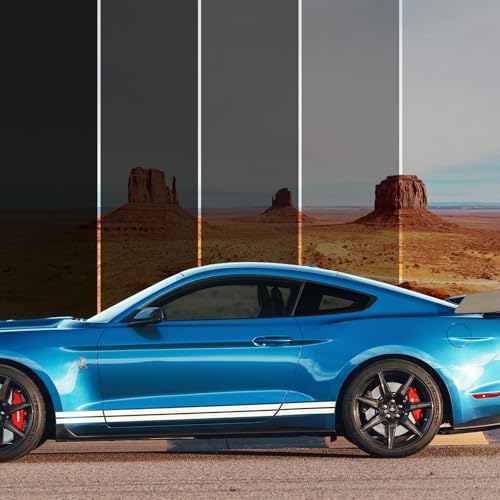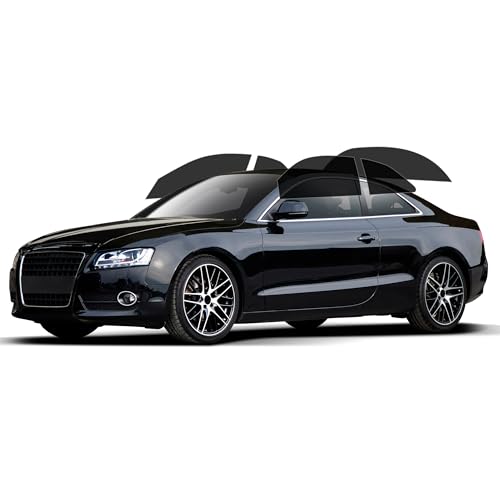Are you tired of that glaring sun while driving or seeking extra privacy for your car? You might be wondering, “how much does it cost to get car windows tinted?” It’s a common question, and the answer can vary widely depending on several factors, including the type of tint, the size of your vehicle, and your location. Many find the process confusing, and dealing with different tinting regulations or choosing the right shop can be daunting.
How much does it cost to get car windows tinted? Generally, the cost of car window tinting ranges from \$100 to \$850 for standard non-reflective tint film and between \$250 to \$1,500 or more for high-performance ceramic, carbon, or metallic film. These are all average price ranges, actual cost will be determined by a variety of factors and considerations.
As an automotive industry professional with over 15 years of experience, I’ve helped countless clients navigate the world of car window tinting. This comprehensive guide will explain everything you need to know about car window tinting costs, types, and benefits. You’ll discover the different types of window tints available, how they impact pricing, and the legal considerations in your state. I’ll also share insider tips on choosing the best tint for your needs and budget, ensuring you make an informed decision.
Key Facts:
* Tinting Improves Safety: Car window tinting can improve safety by reducing glare, which can improve driver visibility and reaction times. Studies have shown that glare can increase the risk of accidents by up to 16%.
* UV Protection: High-quality window tints can block up to 99% of harmful UV rays, protecting both your skin and your car’s interior from sun damage.
* Heat Reduction: Ceramic tints, in particular, can reduce interior temperatures by as much as 25°F, making your car more comfortable and reducing the strain on your air conditioning system.
* Privacy and Security: Tinted windows enhance privacy and can deter theft by making it more difficult to see inside your vehicle.
* Aesthetic Appeal: Many car owners choose to tint their windows simply for the aesthetic enhancement it provides, giving their vehicle a sleek and stylish look.
What Factors Influence the Cost of Car Window Tinting?
Several factors impact the final price of professional car window tinting. Understanding these can help you budget accordingly.
How Does the Type of Tint Film Affect the Price?
The type of film you choose is the most significant cost factor.
Dyed Window Tint
This is the most affordable option, providing a dark appearance but offering minimal heat and UV protection. Dyed window tint primarily relies on dye to block light.
Metalized Window Tint
This type incorporates metallic particles to reflect heat and UV rays. It’s more durable than dyed film but can interfere with radio and cell phone signals.
Carbon Window Tint
Carbon film offers superior heat and UV rejection without signal interference. It has a matte-black finish that many find attractive.
Ceramic Window Tint
This is the premium option, utilizing ceramic particles for maximum heat, UV, and glare reduction. It’s the most expensive but delivers the best performance and longevity.
How Does Vehicle Size Impact Tinting Costs?
Larger vehicles, such as SUVs and trucks, have more window surface area, requiring more tint film and labor, thus increasing the cost. For example, tinting a compact car will generally be cheaper than tinting a full-size SUV.
What Role Does Location Play in Pricing?
Labor costs vary by region. Tinting shops in areas with a higher cost of living may charge more. Additionally, prices can vary depending on the shop’s reputation and experience level. Reputable shops often command a premium but can provide better quality.
What is the Impact of the Number of Windows Tinted?
Obviously, tinting all your car’s windows will cost more than just tinting the front or rear windows. Some people choose to tint only the rear windows for privacy or to protect passengers from the sun.
Why Does the Quality of Tint Film Matter?
Premium tint films from reputable brands like 3M, LLumar, and SunTek generally cost more but offer better performance, durability, and warranty coverage. The manufacturing quality and technology used in premium films provide superior heat rejection and UV protection compared to cheaper alternatives.
What Are the Different Types of Car Window Tint?
Choosing the right type of tint involves balancing your budget with your needs for heat rejection, UV protection, and aesthetics.
What is Dyed Window Tint?
Dyed tint is the most economical option. It primarily provides privacy and reduces glare but offers minimal heat and UV protection. Dyed tint is the most budget-friendly option and a great choice for those seeking a basic tint for appearance.
What is Metalized Window Tint?
Metalized tint uses metallic particles to reflect heat and UV rays. It’s more durable than dyed tint but can interfere with electronic signals.
What is Carbon Window Tint?
Carbon tint offers excellent heat and UV rejection without signal interference. It has a stylish matte finish and is more resistant to fading.
What is Ceramic Window Tint?
Ceramic tint provides the highest level of heat, UV, and glare reduction. It’s the most expensive but offers superior performance and longevity. Ceramic tint represents the pinnacle of window tinting technology, providing unmatched performance in heat and UV rejection.
What Are the Benefits of Car Window Tinting?
Tinting your car windows offers a range of benefits beyond just aesthetics.
How Does Tinting Improve Comfort?
Tinted windows significantly reduce heat buildup inside your car, making it more comfortable, especially during hot summer months. This will reduce reliance on air conditioning and improve fuel efficiency.
How Does Tinting Protect Your Car’s Interior?
UV rays can fade and damage your car’s upholstery, dashboard, and other interior components. Tinting blocks these harmful rays, preserving your car’s interior.
How Does Tinting Enhance Privacy and Security?
Darker tints make it difficult for people to see inside your car, providing privacy for you and your passengers and potentially deterring theft.
How Does Tinting Reduce Glare?
Tinted windows reduce glare from the sun and headlights, improving visibility and reducing eye strain while driving.
What Are the Legal Considerations for Car Window Tinting?
Each state has specific laws regarding the darkness of window tint, measured as Visible Light Transmission (VLT). VLT refers to the percentage of visible light that can pass through the tinted window.
Why is Knowing Your State’s VLT Limits Important?
Tinting your windows darker than the legal limit can result in fines and require you to remove the tint. Exceeding the legal VLT limits can lead to hefty fines and penalties.
Where Can You Find Information on Your State’s Tint Laws?
You can find detailed information on your state’s tint laws on the International Window Film Association (IWFA) website. The International Window Film Association (IWFA) provides a comprehensive resource for understanding state-specific tint laws.
What Are Some Common Tint Law Variations?
Some states have different VLT limits for the front windshield, front side windows, rear side windows, and rear window. Certain states allow medical exemptions for darker tints with a doctor’s note.
How to Choose the Right Car Window Tinting Shop
Selecting a reputable and experienced tint shop is crucial for a quality installation.
Why is Experience Important?
Experienced installers are more likely to provide a flawless, bubble-free tint job that will last for years.
Why Should You Check Reviews and Testimonials?
Online reviews and customer testimonials can give you insights into the shop’s quality of work and customer service.
Why is a Warranty Important?
A reputable shop will offer a warranty on both the film and the installation, giving you peace of mind.
Why Should You Get Multiple Quotes?
Getting quotes from several shops allows you to compare prices and services to find the best value.
How to Maintain Your Car Window Tint
Proper care can extend the life of your window tint and keep it looking its best.
What Cleaning Products Should You Use?
Use ammonia-free glass cleaners and soft microfiber cloths to avoid damaging the tint film.
What Should You Avoid When Cleaning Tinted Windows?
Avoid using abrasive cleaners, scrub brushes, or razor blades, as these can scratch or peel the tint.
How Can You Prevent Damage to Your Tint?
Be careful when rolling down windows that have recently been tinted, and avoid using seat belt buckles or other sharp objects near the tinted windows.
For more detailed guidance, our guide on how to choose the best window tinting near me offers further insights into selecting the right service. Additionally, for a better understanding of specific regulations, you can explore what are the window tint percentages by state. Also, refer to our guide on how much does car tint cost for a more in-depth analysis of cost factors.
FAQs About How Much Does It Cost to Get Car Windows Tinted
What is the average cost to tint a car’s windows?
The average cost ranges from \$100 to \$400 for standard film and \$250 to \$600 or more for high-performance films.
How long does it take to tint car windows?
A typical tint job takes 2-4 hours, depending on the vehicle and the number of windows being tinted.
Does window tint really reduce heat?
Yes, high-quality window tints, especially ceramic tints, can significantly reduce interior temperatures.
Can I tint my windows myself?
While DIY tint kits are available, professional installation is recommended for the best results.
Is car window tinting legal?
Tinting laws vary by state, so it’s essential to check your local regulations.
How dark can I legally tint my windows?
Legal limits vary by state and are measured in Visible Light Transmission (VLT).
Will window tint affect my visibility at night?
High-quality tints are designed to maintain good visibility, even at night.
What is the best type of window tint?
Ceramic tint offers the best heat and UV rejection, but carbon tint is a good alternative at a lower price point.
How long does window tint last?
With proper care, high-quality window tint can last for 10 years or more. Cheaper films may need to be replaced sooner.
Does window tint prevent glass from breaking?
While tint film won’t make your windows shatterproof, it can help hold shattered glass together in case of an accident.
Summary
Car window tinting offers numerous benefits, including improved comfort, UV protection, enhanced privacy, and a sleek appearance. The cost of tinting varies depending on factors like the type of film, vehicle size, location, and the number of windows tinted. While dyed window tint is the most affordable option, ceramic tint provides the best performance and longevity. Understanding your state’s tint laws is crucial to avoid fines. Choosing a reputable tint shop and properly maintaining your tinted windows will ensure a long-lasting, high-quality result. Ready to enhance your driving experience with window tinting? Consider the factors discussed in this guide to make an informed decision that suits your needs and budget.






![What Car Is Chevy Bringing Back in [year]? New Lineup Revealed 8 What Car Is Chevy Bringing Back in [year]? New Lineup Revealed](https://carxplorer.com/wp-content/uploads/2026/01/What-Car-Is-Chevy-Bringing-Back-in-year-New-Lineup-Revealed-1-1-60x60.jpg)
